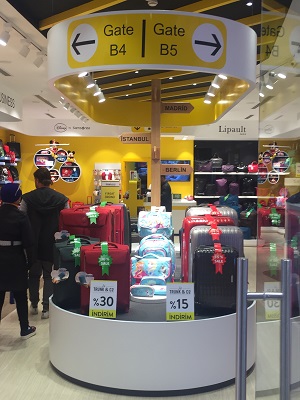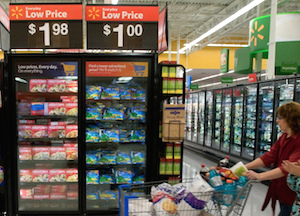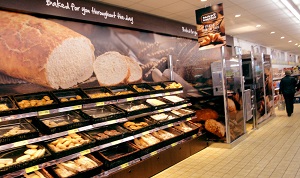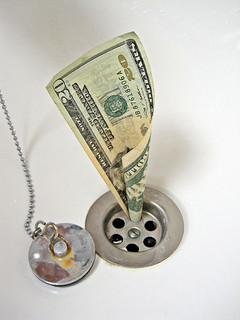 Aldi, and so-called hard discounters like them, are taking the world by storm. From their German heartland they are charging across the globe, taking significant share in neighboring markets such as the UK and Ireland, as well as challenging the long-standing grocery duopoly in Australia. Even the United States, which has withstood many retail invasions, is succumbing to the ‘charms’ of the Aldi store. How are they doing it? Contrary to this rather strangely toned article in Forbes, they are not doing it by subversion. No, it’s not witchcraft. It’s a rather simple business principle that some of the big retailers seem to have forgotten. They have a simple formula that begins with a simple idea: giving the shopper what they want.
Aldi, and so-called hard discounters like them, are taking the world by storm. From their German heartland they are charging across the globe, taking significant share in neighboring markets such as the UK and Ireland, as well as challenging the long-standing grocery duopoly in Australia. Even the United States, which has withstood many retail invasions, is succumbing to the ‘charms’ of the Aldi store. How are they doing it? Contrary to this rather strangely toned article in Forbes, they are not doing it by subversion. No, it’s not witchcraft. It’s a rather simple business principle that some of the big retailers seem to have forgotten. They have a simple formula that begins with a simple idea: giving the shopper what they want.
Aldi gives shoppers what they want…
The Forbes article seemed to suggest that this invasion was unwanted, subversive, and dangerous to the American way of life. Yes, there are some aspects of the Aldi business model which walk a very fine line on business ethics (their blatant ripping off of packaging and product, see below) but ultimately Aldi’s success must come down to one simple fact. A simple truth that Forbes chose to ignore. American shoppers like Aldi. Any winning retail formula must begin here. Aldi’s winning retail approach shrinks ranges and stores, creating a simpler shop. Like their brethren across the world, American shoppers have found that this approach simplifies and shortens a ‘big box’ shopping experience that wasn’t particularly pleasant.
Aldi recognizes that not all shoppers want the same thing
The comments sections in articles like these are always fascinating. Many commentators say that they hate Aldi, and would never shop there (of course many never have!) Others seem to have tried it and loved it. Aldi’s winning retail formula seems to be built around that very simple marketing practice of segmentation: Aldi aren’t interested in everyone. They recognize that not everyone will like their stores, and they seem to be totally OK with that. They aren’t building mega stores that will attempt to somehow give everyone what they want from this store. Aldi’s winning retail approach recognizes that they don’t need to keep everyone happy. But if enough shoppers are dissatisfied with the big box shopper experience, then Aldi is in with a chance.
Aldi recognizes that many shoppers don’t like grocery shopping
One of the biggest challenges to the old world of grocery shopping is that the process simply isn’t pleasant. A lot of grocery shoppers see the supermarket as a grind and a chore – not a great scenario if you own a grocery retail brand. Gone are the days when supermarkets were interesting and adventuresome and something new. Instead of trying to improve the shopping experience by adding bells and whistles, Aldi’s winning retail formula takes a different tack – give what many shoppers really want: a quicker, easier trip.
Aldi sees anything the shopper doesn’t want is unnecessary cost
The real magic in Aldi’s offer however is their ability to strip away unneeded cost. Their absolute focus on customer value allows them to question everything in a simple way. Does it create value for the shopper? If not, then get rid of it. Promotions that cost money to implement, and increase out of stocks? Get rid of them, and give shoppers a great deal on price all of the time. Two hundred variants of laundry detergent? That ties up a lot of cash – let’s just have three. Store staff, free bags, etc. if they aren’t necessary to the shoppers’ experience, then get rid of them, and invest the savings in something the shopper wants.
Aldi question the value of grocery brands
Aldi don’t always play fair, it’s true. Part of their winning retail formula is to sail very close to the wind on copycats of famous brands. Some of their NBE (Near Brand Equivalents) are shockingly close to the brand that they are copying in pack design and product. I remember marketing in the UK nineties when Aldi first arrived and saw this first hand – and I know it isn’t pleasant to be a marketer and see someone do this to your brand. The first response of indignation is perfectly reasonable, for sure. And yes, there is plenty of piggybacking on someone else’s hard work and investment.
…And so should brand owners
But let’s look from the point of view of the shopper. Why is the brand so much more expensive? What marketers call ‘investment’ (promotions, advertising, social campaigns and the like) can start to look like a ‘brand tax’ when a shopper can get almost the same thing for a fraction of the price.
And here is another thought. If your brand is apparently so easy to replicate, that a similar graphic and a similar product is enough to tease away shoppers and consumers, then the brand has a problem. Rather than bemoaning the approach, marketers need to take a long hard look at their marketing, both consumer and shopper, and ask the Aldi question: does it add enough value to the customer. If it doesn’t, why exactly are we doing it?
The world is in flux, and shoppers are testing brands and retailers. Too many brands are spending money on things that don’t add value to customers: be they shoppers or consumers. Aldi’s winning retail formula works because of one simple question – does this add value to my customer. Before you invest in consumer or shopper marketing, perhaps you should ask the same question…
What do you think? Will Aldi continue to rise or will shoppers tire? Let me know what you think in the comments below.
Image: Flickr





